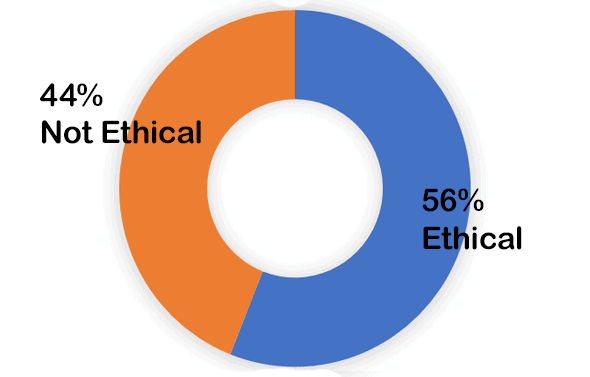This is the January 2020 edition of our monthly series of Ethics case studies titled What Do You Think? This series is comprised of case studies from NSPE archives, involving both real and hypothetical matters submitted by engineers, public officials and members of the public.
Your peers and the NSPE Board of Ethical Review have reviewed the facts of the case as shown below. And, here are the results.
Your opinion has been registered for the February 2020 edition of our monthly series of Ethics case studies titled What Do You Think?
Your vote is recorded as:

Want to know how your peers voted? We’ll send you an email with the poll results on February 25.
Your opinion has been registered for the February 2020 edition of our monthly series of Ethics case studies titled What Do You Think?
Your vote is recorded as:

Want to know how your peers voted? We’ll send you an email with the poll results on February 25.
A Review of the Facts
Mike, an environmental engineer, is retained by Acme, a major industrial owner, to examine certain lands adjacent to an abandoned industrial facility formerly owned and operated by Acme. Acme’s attorney requests that as a condition of the retention agreement that Mike sign a secrecy provision whereby Mike would agree not to disclose any data, findings, conclusions or other information relating to his examination of the Acme’s land to any other party unless ordered by a court. Mike signs the secrecy provision.
Would it be ethical for Mike to agree not to disclose any of his data, findings, conclusions or other information to any other party unless ordered by a court?
Here is the result of our survey of your peers:

Applicable NSPE Code References:
Code II.1.a: If engineers’ judgment is overruled under circumstances that endanger life or property, they shall notify their employer or client and such other authority as may be appropriate.
Code II.1.c: Engineers shall not reveal facts, data, or information without the prior consent of the client or employer except as authorized or required by law or this Code.
Code III.4: Engineers shall not disclose, without consent, confidential information concerning the business affairs or technical processes of any present or former client or employer, or public body on which they serve.
Discussion
The duty of the engineer to maintain the confidence of his client is well-established in the context of engineering ethics. Engineers are frequently called upon by their clients to perform services in areas that involve restricted or undisclosed material or information. The obligation to maintain the confidences of the client is based upon the general view that certain information about the business interests or technical affairs of the client are proprietary in nature or, if disclosed could harm the business interests of the client. As a professional, the engineer has a duty to his client to make reasonable efforts not to intentionally or negligently disclose the information to third parties.
The Board in the past had occasion to examine this ethical obligation. In BER Case 87-2, the Board considered a case involving the disclosure of previous work by a consultant. After being terminated by one client, the engineer agreed to provide services to a second client. As part of those services, the engineer divulged specific information unique to the product designed for the first client. In ruling that it was unethical for the engineer to divulge the specific information unique to the product designed earlier by him for the first client, the Board interpreted the language of Code III.4 and determined that the Section applied to the consulting engineer, as well as the employed engineer. As this case involves a consulting engineer, we agree with the Board’s determination on this issue in Case 87-2.
In BER Case 89-7, in a case involving an engineer’s failure to report safety violations by a client, the Board ruled that it was unethical for the engineer not to report the violations to the appropriate public authorities. The Board noted that while the obligation of the engineer to refrain from revealing confidential information concerning the business affairs of the client without consent is significant, matters of public health and safety must take precedence. Later in BER Case 92-6, the Board ruled that it was unethical for an engineer to fail to advise his client that he suspected hazardous material and provide a recommendation concerning removal and disposal in accordance with federal, state and local laws. In that opinion, the Board noted that the engineer made no oral or written promise to maintain the client’s confidentiality.
While these cases raise important issues, we must clearly state that the provisions of the Code must be interpreted in a balanced and measured way. In this context, we should note that Code III.4 must be read in light of other sections of the Code. particularly Code II.1.a. and Code II.1.c. Those sections read together remind the engineer that, in the event that the engineer’s obligation of nondisclosure to his client conflicts with his obligation to protect the safety, health, property and welfare to the public, we believe the former obligation must yield.
In this case, we believe that Mike’s decision to sign the secrecy provision was a breach of his ethical obligation under Code II.1.c. In essence, Mike, agreed to withhold any information in relation to his services in connection with his client’s property even if, following the execution of the contract, Mike learned that certain conditions existed on his client’s property that endangered the public health and safety. We do not believe an engineer should ever agree, either by contract or other means, to relinquish his right to exercise professional judgment in such matters. By doing so, the engineer has compromised the essence of his professional integrity.
The Ethical Review Board’s Conclusion

It would be unethical for Mike to agree not to disclose any of his data, findings, conclusions or other information to any other party unless ordered by a court.
BOARD OF ETHICAL REVIEW
Donald L. Hiatte, P.E.; William W. Middleton, P.E.; Robert L. Nichols, P.E.; William E. Norris, P.E.; William F. Rauch, Jr., P.E.; Jimmy H. Smith, P.E.; William A. Cox, Jr., P.E., Chairman
*Note-This opinion is based on data submitted to the Board of Ethical Review and does not necessarily represent all of the pertinent facts when applied to a specific case. This opinion is for educational purposes only and it should not be construed as expressing any opinion on the ethics of specific individuals. This opinion may be reprinted without further permission, provided that this statement is included before or after the text of the case. In regard to the question of application of the Code to corporations vis-à-vis real persons, business form or type should not negate nor influence conformance of individuals to the Code. The Code deals with professional services, which services must be performed by real persons. Real persons in turn establish and implement policies within business structures. The Code is clearly written to apply to the engineer and it is incumbent on a member of NSPE to endeavor to live up to its provisions. This applies to all pertinent sections of the Code.








Yikes! we need more and better training in ethics – NOT just the law. This was not that difficult an exercise. Bad enough that DeSantis and friends are trying to sunset the PE in Florida!